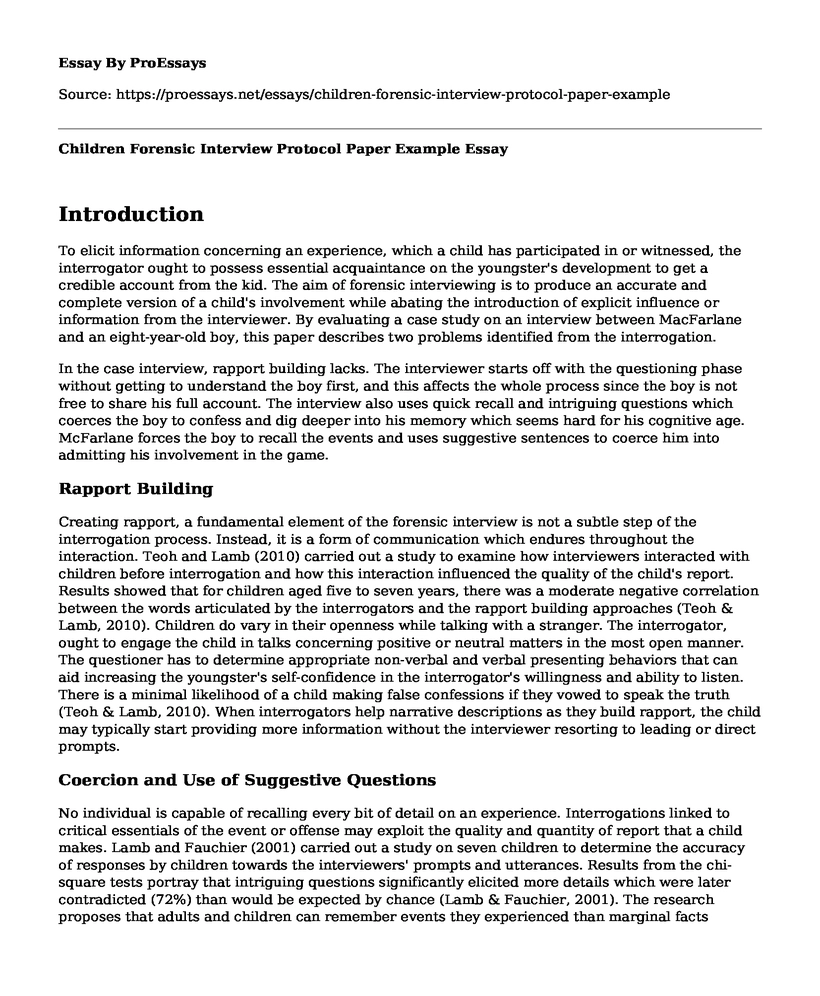Introduction
To elicit information concerning an experience, which a child has participated in or witnessed, the interrogator ought to possess essential acquaintance on the youngster's development to get a credible account from the kid. The aim of forensic interviewing is to produce an accurate and complete version of a child's involvement while abating the introduction of explicit influence or information from the interviewer. By evaluating a case study on an interview between MacFarlane and an eight-year-old boy, this paper describes two problems identified from the interrogation.
In the case interview, rapport building lacks. The interviewer starts off with the questioning phase without getting to understand the boy first, and this affects the whole process since the boy is not free to share his full account. The interview also uses quick recall and intriguing questions which coerces the boy to confess and dig deeper into his memory which seems hard for his cognitive age. McFarlane forces the boy to recall the events and uses suggestive sentences to coerce him into admitting his involvement in the game.
Rapport Building
Creating rapport, a fundamental element of the forensic interview is not a subtle step of the interrogation process. Instead, it is a form of communication which endures throughout the interaction. Teoh and Lamb (2010) carried out a study to examine how interviewers interacted with children before interrogation and how this interaction influenced the quality of the child's report. Results showed that for children aged five to seven years, there was a moderate negative correlation between the words articulated by the interrogators and the rapport building approaches (Teoh & Lamb, 2010). Children do vary in their openness while talking with a stranger. The interrogator, ought to engage the child in talks concerning positive or neutral matters in the most open manner. The questioner has to determine appropriate non-verbal and verbal presenting behaviors that can aid increasing the youngster's self-confidence in the interrogator's willingness and ability to listen. There is a minimal likelihood of a child making false confessions if they vowed to speak the truth (Teoh & Lamb, 2010). When interrogators help narrative descriptions as they build rapport, the child may typically start providing more information without the interviewer resorting to leading or direct prompts.
Coercion and Use of Suggestive Questions
No individual is capable of recalling every bit of detail on an experience. Interrogations linked to critical essentials of the event or offense may exploit the quality and quantity of report that a child makes. Lamb and Fauchier (2001) carried out a study on seven children to determine the accuracy of responses by children towards the interviewers' prompts and utterances. Results from the chi-square tests portray that intriguing questions significantly elicited more details which were later contradicted (72%) than would be expected by chance (Lamb & Fauchier, 2001). The research proposes that adults and children can remember events they experienced than marginal facts witnessed. Preparing for a forensic interview with children, the interviewer ought to ask questions which are open-ended, permitting the interviewee to offer a free version of the transgression. It is also crucial to recognize the observer's incentive during the interview. A child can gauge their conducts and their friend's behaviors in moral terms and therefore determine what to say to protect their self-image.
Impact of the Problems on the ReportWith the lack of a rapport-building before the interview process, the boy sounds unsure of what he is expected to say. There is lack of trust and appropriate orientation in the interrogation thus the boy does not open up willingly to share information until he gets coerced. The report obtained from the child also seems to be accurate and detailed although it is incomplete since the interviewer uses recall approach. Using recall by MacFarlanepossess a risk of eliciting feedback which is potentially erroneous or less accurate since the boy is forced to reach past his stored reminiscence. The interviewer over-used these questions; hence the report may not exhibit efficient fact-finding and integrity functions of the interview.
Recommendation
Forensic interviewers ought to motivate the most candid, complete, and accurate information from a child and in turn, the kid should be the one to communicate more as they get interviewed. An interviewer needs to create a good rapport with a child, to build trust between the two. To achieve this, the evaluator can start by understanding the kid's language structures, measure his inclination to take part in the interview, and begin to suitably respond to a child's cultural, emotional, and developmental desires. Providing interview directives while creating rapport, sets expectations on the child's obligation to provide a complete and accurate account as well as mitigating openness. Interrogators need to use cued and open-ended questions competently and adequately to support the child's readiness and capacity to define events on their own. This tactic will lessen the risk of the questioner tainting the child's narrative, improving the quality of the boy's report from the interview.
References
Lamb, M. E., & Fauchier, A. (2001). The effects of question type on selfcontradictions by children in the course of forensic interviews. Applied cognitive psychology, 15(5), 483-491.
Teoh, Y. S., & Lamb, M. E. (2010). Preparing children for investigative interviews: Rapport-building, instruction, and evaluation. Applied Developmental Science, 14(3), 154-163.
Cite this page
Children Forensic Interview Protocol Paper Example. (2022, Jun 16). Retrieved from https://proessays.net/essays/children-forensic-interview-protocol-paper-example
If you are the original author of this essay and no longer wish to have it published on the ProEssays website, please click below to request its removal:
- Research Paper Sample: Forensic Entomology
- The Color of Justice - Essay Sample
- Social Work Intervention Paper Example
- Essay Example on Decriminalization of Prostitution: The Dark Side
- Patient Protection and Affordable Care Act: Transforming U.S. Healthcare Access for Everyone
- Essay Example on Stop and Frisk: Legal Exercise or Civil Rights Abuse?
- Essay Example on US Court of Appeals: Stephen A. Eiland v. Unfavorable Jury Decision







